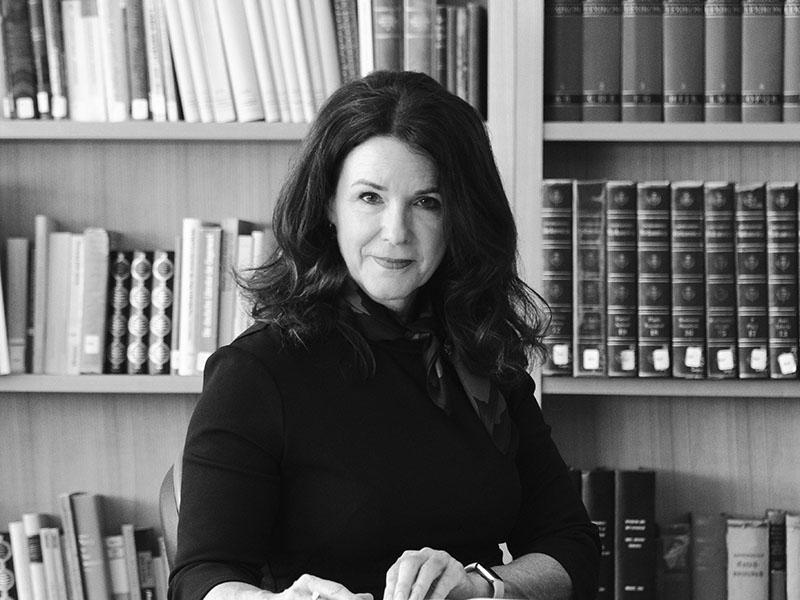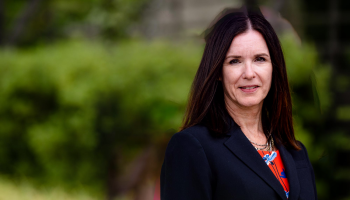Five Questions with A&S Dean Christa Acampora

Christa Acampora became dean of the College and Graduate School of Arts & Sciences in 2022. Born in Virginia, she served as deputy provost and professor of philosophy at Emory University in Atlanta before joining the University of Virginia. She is an acclaimed philosopher and expert in modern European philosophy, moral psychology, and aesthetics. She follows a servant leadership philosophy when approaching her role as dean and believes the pathway for UVA to become the best public university in the nation, and one of the best universities anywhere in the world, runs directly through the College and Graduate School of Arts & Sciences.
Q: How will private support help you achieve your vision for the College and Graduate School of Arts & Sciences?
A: Achieving our vision requires transformation, and we’re incredibly lucky and privileged that there is a legacy of transformative giving in the College. Philanthropic impacts have tangibly shaped the College—such as the development of the South Lawn that’s now a thriving hub for A&S, including the stunning Nau Hall, which provides an inspirational setting for classes and academic convenings. Alumnus John Nau’s donations of his time, talent, and treasure made that building a reality, so it was fitting that he attended an inaugural Investiture Ceremony there where we honored 125 faculty holding named and endowed chairs to recognize and celebrate impact they’ve had on the College and our students.
Private support is essential for creating the exceptional student experience we aim to deliver. It has provided the resources to develop and scale the Engagements curriculum for First Year College students, giving them an extraordinary introduction to liberal arts and sciences. I’m astonished by—and grateful for—this legacy, and it’s a large part of what drew me to UVA. It has inspired me to think big, to dream bigger, and to set ambitious goals because I know big things are possible here.
Among our strategic priorities in A&S is to deliver a second-to-none undergraduate experience that is also an unprecedented achievement in public higher education. It’s an ambitious goal and private support is crucial in helping us bring it to life through curricular innovations, academic wayfinding, and experiential learning, such as internships, study abroad, and intensive research opportunities. Expanding access to these features of excellence requires transformation that will mean experimenting, innovating, and addressing emerging needs quickly—all things that private support enables—really, it is the key to achieving excellence.
Q: You have extensive experience in supporting faculty, advancing graduate students, and improving student advising, all of which align with the 2030 strategic plan goals. What do you see ahead for furthering these initiatives at UVA?
A: I am truly grateful that we have the University 2030 plan to guide our steps. When I came into my role, I was immediately energized by the opportunity to translate those strategic goals into a vision we can bring to life within A&S. Part of our aspiration in realizing an “unprecedented achievement in public higher education” is transforming the Graduate School by focusing on graduate excellence and the resources to support it, which is why we launched a Campaign for Graduate Excellence. Graduate excellence is the engine of value that enhances everything that we do. This is because exceptional graduate students advance the frontiers of knowledge and discovery, mentor undergraduate students, and serve as thought partners for our faculty. As we make the Graduate School more competitive, we support more students engaged in leading- and cutting-edge research and creative expression, and that fuels the ambitions represented in A&S’s overarching research strategy, creating even more opportunities for our undergraduate students to learn among the very best.
I have been amazed and honored by the response so far. In just one year, we secured commitments in excess of $40 million. That’s more than a third of the total amount the endowment for the Graduate School realized in more than 130 years. This level of support has been recognized nationally as extraordinary—just what one might expect from determined and committed Wahoos. University leadership has also committed significant resources to co-invest alongside donors to create a legacy of excellence that will be realized for generations to come.
Q: What do you hear from alumni of the College and Graduate School? What inspires and motivates them?
A: UVA is legendary in higher education for the devotion, passion, and engagement of our alumni base, and many of the University’s most successful alumni are graduates of the College. Since becoming dean, I’ve enjoyed getting to meet alumni from all over the world, and they have been the key to helping me successfully transition into my new role. That’s because they have taught me so much about the University by helping me see it through their eyes—both what it has been and how they envision it in the future. I have grown to appreciate their attachment to Grounds, including its beauty and source of inspiration. The friendships they have with one another, and with our celebrated faculty, are relationships that last a lifetime. And there is a deep sense of connection to our place in history and our responsibility to cherish and honor that place. This passion motivates me every single day.
I also feel grateful to have College Foundation trustees as my thought-partners—their talent and perspective provide a true brain trust for me.
Achieving our vision requires transformation, and we’re incredibly lucky and privileged that there is a legacy of transformative giving in the College.
– Christa Acampora
Q: You’ve lived in New York City and Atlanta, among other places, what is life like for you now in Charlottesville? Where is your favorite place on Grounds and why?
A: As the newest neighbors of the Rotunda, in Pavilion II, my husband, Jesús—and even Henry, the cat—realize what a privilege it is to live on the Lawn and be part of the energy on Grounds. I am often amazed by how our Grounds continue to fulfill Jefferson’s vision of creating a living-learning community, all while adapting to new generations. I see how this also supports a community of connection and genuine affection. As one student said to me, “It is the people that make a place worth remembering,” and I couldn’t agree more.
As we approach the nation’s semiquincentennial—the 250th anniversary of the Declaration of Independence—I feel profound gratitude and pride to be at the University and to get to be a convener for thinking about what democracy might require of us in the future. It was a genuine treat for me to begin this conversation and share reflections with students in my First-Year seminar last semester, as we met in my living room, the largest of the original classrooms in the Academical Village.
When I do have a moment to spare, I especially enjoy time in the garden of Pavilion VIII, which feels incredibly private and serene. I also love to explore the trails on O’Hill after having a hot cup of coffee on my balcony. However, I think the very best spot on Grounds—and I mean it—is my living room when it’s packed with students. We have the best students in the nation, and to gather them into my home feels like living in a jewel box. There’s nothing in New York City or Atlanta that can hold a candle to that.
Q: As we begin a new academic year, what excites you most about what is ahead for UVA?
A: This is a tough question because it’s a challenge to narrow it down to just one thing. A wonderful feature of the College is that it is large, diverse, and complex—essentially, we are larger than most universities in the country, and we encompass the full spectrum of the liberal arts and sciences. Our size, scale, and complexity in Arts & Sciences can make it challenging to forge shared goals. We’ve spent the better part of the past two years sharpening a collective vision that connects aspirations for a best-in-class undergraduate experience; graduate excellence; top-talent recruitment and re-recruitment for faculty and staff; and high-impact research, scholarship, and creative activity.
This creates opportunities to innovate with leading- and cutting-edge fields, everything from astrochemistry to digital media design, and, of course, artificial intelligence. There would be no artificial intelligence without the liberal arts and sciences insofar as AI relies on logic, computational representations of human thought, and a deep understanding of language and meaning. The workforce will undergo significant transformation because of developments and applications of AI. The proliferation of artificial intelligence will make the cultivation of human intelligence all the more important—and valuable. And that meeting will require us to have a more capacious understanding of what is human, more than human, and humane. So, I see a bright future for the liberal arts and sciences with these challenges and opportunities ahead, and I can think of no better place ready to tackle these head on than at UVA.








